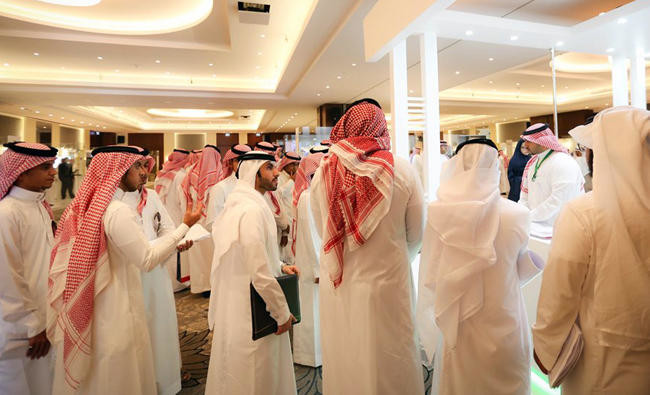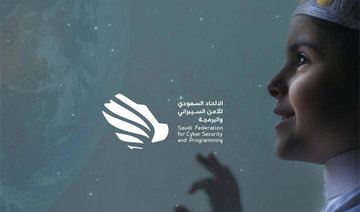WASHINGTON: Saudi students who have forged reputations as innovators are urging fellow young Saudis to seize a once-in-a-generation opportunity to reshape their futures.
At a packed conference room at Washington DC’s most iconic hotel, the Willard InterContinental, just across from the White House, a series of speakers took to the stage on Wednesday to call on the Saudi-majority audience to take up the challenge of reform.
“Never be afraid to do something or to be the first to do it,” said Razan Alageel, who last year won the outstanding youth delegate award at a UN youth project.
Alageel, who is studying political science at Appalachian State University in the US, said Saudis must not be intimidated by the scale of the tasks ahead as they face up to domestic and international challenges.
“You will always have a mountain to climb and another cliff to jump off. Believe in your instincts. You are powerful beyond measure, so use it,” she said.
She made her comments at a Misk Talk event in Washington DC, organized by the Prince Mohammed bin Salman bin Abdulaziz Philanthropic Foundation.
Misk, as the foundation is known for short, was set up in 2011 by the crown prince to promote innovation and education opportunities for young Saudis, and to encourage media that “knows no boundaries.”
More than half of the Kingdom’s 27 million nationals are below age 30, a demographic situation that poses a serious economic challenge, and many get their news from social media outlets rather than relying on traditional sources.
Saudi Arabia has historically been able to employ young people in government agencies, paid for by the country’s massive oil wealth. But the crown prince has embarked on a bold economic reform agenda that, if successful, will radically shake up government subsidies in the state.
The Misk foundation is part of that effort. At Wednesday’s presentation, the message to young Saudis was that they, not oil, are the country’s most valuable resource.
Mohammed Bakhsh, an undergraduate at George Washington University, used his presentation to encourage young Saudis to take risks and not fear failure, both central elements of the entrepreneurship the crown prince has called for.
“Failure is one of the best teachers, failure is the essence of success,” he said, a mantra more typically associated with Silicon Valley than old-style Saudi economic policy.
Much was also said about the reforms that have taken place in Saudi, including allowing women to drive.
“Remember, less than five years ago we couldn’t have discussions about women’s rights in this formal capacity, that was impossible and unheard of,” said Jehan Al-Mahmoud, a PhD student in socio-lingustics at Georgetown University.
“It has been a journey for all of us. The Saudi youth, we are all witnessing this incredible transformation in our country and we are getting there.
“As the Saudi nation, we got lucky with the oil at first but we continue to get lucky with knowledgeable, ambitious leadership that cultivates the most valuable resource that we have — us,” she said.
Young Saudis urged to seize opportunities to shape economic future
Young Saudis urged to seize opportunities to shape economic future

Saudi minister holds talks with Chinese, EU officials on climate, global issues

RIYADH: Saudi Arabia's Minister of State for Foreign Affairs and Climate Envoy Adel Al-Jubeir received China's Special Envoy for Climate Change Liu Zhenmin in Riyadh on Sunday.
During the meeting, they discussed strengthening cooperation in climate action and environmental conservation, along with other topics of mutual interest.
Both officials also reviewed the Kingdom’s ongoing initiatives and achievements in this field, the Saudi Press Agency reported.
In a separate meeting, Al-Jubeir received the deputy secretary-general for political affairs at the European External Action Service, Olof Skoog, and his accompanying delegation.
The meeting reviewed international developments and the efforts being made to address them, in addition to discussing topics of mutual interest.
Sheikh Saleh bin Humaid to deliver Arafah sermon during Hajj 2025

- The day of Arafah (the 9th of Dhul Hijjah) is widely considered the pinnacle of Hajj, marking the most important day for pilgrims
- The sermon is delivered from Masjid Al-Nimra on Mount Arafat before Dhuhr and Asr prayers are performed together on Dhul Hijjah 9
RIYADH: Sheikh Saleh bin Humaid will deliver the Arafah sermon during this year’s Hajj, the Presidency of Religious Affairs announced on Sunday.
The day of Arafah (the 9th of Dhul Hijjah) is widely considered the pinnacle of Hajj, marking the most important day for pilgrims. Muslims around the world who are not performing the pilgrimage mark the day by fasting and engaging in worship.
The sermon is delivered from Masjid Al-Nimra on Mount Arafat before Dhuhr and Asr prayers are performed together on Dhul Hijjah 9.
Head of Religious Affairs of the Grand Mosque and the Prophet’s Mosque Sheikh Abdulrahman Al-Sudais thanked King Salman and Crown Prince Mohammed bin Salman for the appointment.
The appointment underscores the Kingdom’s global religious leadership, reflects its continued support for religious institutions, and exemplifies the leadership’s care for the two holy mosques, the presidency said.
Saudi deputy FM receives EU official in Riyadh

- A meeting was also held as part of the third round of political consultations between Saudi Arabia and the EEAS
RIYADH: Saudi Deputy Minister of Foreign Affairs Waleed Elkhereiji received Olof Skoog, deputy secretary-general for political affairs at the European External Action Service, and his accompanying delegation, in Riyadh on Sunday.
During the meeting, they discussed bilateral relations between the Kingdom and the EU and other topics of common interest, the Foreign Ministry wrote in a post on X.
A meeting was also held as part of the third round of political consultations between the Kingdom and the EEAS. Senior officials from both sides participated in the session, chaired by Raed bin Khalid Qarmli, director-general of the general directorate of policy planning at the Saudi Foreign Ministry, with Skoog representing the European side.
Pakistani ambassador to Saudi Arabia meets with CEO of Diriyah Gate Development Authority

- The meeting focused on strengthening Saudi-Pakistani ties in the field of heritage and culture
RIYADH: Ahmad Farooq, Pakistan’s ambassador to Saudi Arabia, met with Jerry Inzerillo, CEO of Diriyah Gate Development Authority in Riyadh.
The meeting focused on strengthening Saudi-Pakistani ties in the field of heritage and culture, the Pakistani Embassy wrote in a post on X on Sunday.
The ambassador presented Inzerillo with a painting from his own Diriyah-themed series, created to celebrate the Kingdom’s history and heritage.
He also presented him with a made-in-Pakistan FIFA-standard football “symbolizing Pakistan’s craftsmanship and the mutual spirit of friendship.”
Saudi reserve engages pilgrims on biodiversity

- Pilgrims were welcomed at Al-Shuqaiq in the Jouf region, where more than 4,000 gifts reflecting the reserve’s history and conservation efforts were distributed
RIYADH: Hajj pilgrims arriving in the Kingdom by land were introduced to projects and initiatives of the King Salman bin Abdulaziz Royal Reserve Development Authority.
The initiative aims to enhance biodiversity, restore vegetation and breed endangered species to create a more sustainable natural environment.
The authority also distributed educational brochures to raise awareness about environmental preservation, the Saudi Press Agency reported.
Pilgrims were welcomed at Al-Shuqaiq in the Jouf region, where more than 4,000 gifts reflecting the reserve’s history and conservation efforts were distributed.
Visitors were informed about the reserve’s environmental heritage, biodiversity, and commitment to sustainable ecological stewardship, the SPA added.
The authority works to preserve biodiversity by protecting habitats and creating safe environments for wildlife and plants to thrive.
Its achievements include planting more than 2.4 million trees, scattering four tonnes of native seeds and rehabilitating 250,000 hectares of degraded land.
The reserve hosts more than 290 documented bird species — about 58 percent of those recorded in the Kingdom — and includes five internationally recognized important bird areas.
Covering 130,700 sq. kilometers, the King Salman Reserve is the largest natural terrestrial reserve in the Middle East, spanning four administrative regions: Jouf, Hail, Northern Borders, and Tabuk.




















